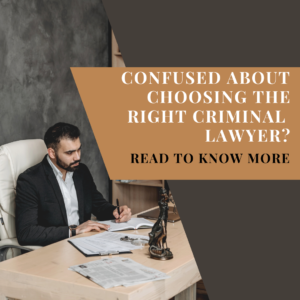Navigating the labyrinthine corridors of the legal system, particularly in criminal cases, demands the expertise of a seasoned and resolute legal advocate. This guide will walk you through 13 pivotal factors, each a stepping stone toward effective legal representation and a compelling defense strategy.
Whether you’re facing serious allegations or seeking to safeguard your rights, these considerations are your compass on the path to justice.

Important factors to consider
Experience and Expertise
-
- Seek a lawyer with extensive experience in handling cases similar to yours.
- Look for someone well-versed in the complexities of criminal law and courtroom procedures.
Reputation and Reviews
-
- Consider the lawyer’s standing in the legal community.
- Check online reviews and testimonials to gauge client satisfaction.
Specialization in Criminal Law
-
- Choose a lawyer with specialized expertise in criminal law.
- Ensure they have a deep understanding of the specific nuances of your case.
Communication Skills
-
- Opt for a lawyer who communicates clearly and keeps you informed throughout the legal process.
- Look for someone who can explain legal terms in a way that’s easy to understand.
Availability
-
- Ensure your chosen lawyer can dedicate sufficient time and attention to your case.
- Confirm their availability for key court dates and meetings.
Legal Fees and Transparency
-
- Discuss the fee structure in detail and ensure transparency regarding any additional costs.
- Seek clarity on billing methods, whether it’s a flat fee or hourly billing.
Case Assessment and Strategy
-
- Choose a lawyer capable of conducting a comprehensive assessment of your case.
- Look for someone who can develop a strategic plan tailored to your specific legal needs.
Courtroom Experience
-
- Opt for a lawyer with significant experience in the local court system.
- Look for someone familiar with the judges, prosecutors, and local legal procedures.
Client References
-
- Request references from past clients to gain insights into the lawyer’s performance.
- Consider speaking with former clients to understand their experiences firsthand.
Success Rate
-
- While not definitive, a lawyer’s success rate can provide an indication of their effectiveness.
- Inquire about their track record and any notable victories in cases similar to yours.
Compatibility and Trust
-
- Choose a lawyer with whom you feel comfortable discussing sensitive information.
- Ensure they prioritize your best interests and handle your case with professionalism.
Legal Fees and Contracts
-
- Carefully review the fee agreement and contract terms before making any commitments.
- Seek clarification on any ambiguous points to avoid any misunderstandings later on.
Ongoing Support and Updates
-
- Select a lawyer who commits to providing regular updates on your case.
- Ensure they maintain open communication channels for any new developments or changes.
FAQS about Choosing the Right Criminal Lawyer
Why is it crucial to select a specialized criminal lawyer?
Opting for a specialized criminal lawyer is crucial as they possess extensive knowledge of the nuances of criminal law, improving the prospects of a successful defense.
How can I evaluate a lawyer’s standing within the legal community?
Evaluating a lawyer’s standing within the legal community can be done through online reviews, seeking referrals, and checking for any disciplinary actions or complaints against them.
What attributes indicate effective communication in a lawyer?
Effective communication in a lawyer involves the ability to explain legal concepts clearly and provide regular updates on the progress of your case.
Is it important to inquire about a lawyer’s success rate in handling cases?
Yes, it is essential to inquire about a lawyer’s success rate as it offers insights into their competence and ability to handle cases similar to yours.
What constitutes a fair and transparent fee structure for a criminal lawyer?
A fair and transparent fee structure should be agreed upon in advance and may involve a flat fee or an hourly billing system, depending on the nature of the case.
How significant is a lawyer’s familiarity with the local court system?
A lawyer’s familiarity with the local court system is significant as it helps them understand local procedures and the inclinations of judges and prosecutors.
How can I ensure I can trust my lawyer with my case?
Trust can be established by selecting a lawyer who prioritizes your best interests and conducts themselves with professionalism and integrity.
Why is a lawyer’s availability important during a case?
A lawyer’s availability for court appearances, meetings, and case updates is crucial to ensure effective communication and timely legal guidance.
What aspects should I pay attention to in a lawyer’s contract?
When reviewing a lawyer’s contract, pay attention to the fee agreements, billing methods, and any potential additional costs or expenses to avoid any future discrepancies.
How can I verify a lawyer’s specialization in criminal law?
You can verify a lawyer’s specialization in criminal law by examining their practice areas and past cases, ensuring they possess the necessary expertise to handle your specific case.
Conclusion
Selecting the right criminal lawyer is a critical decision that can significantly impact the outcome of your case. Consider their experience, reputation, specialization, communication skills, availability, and legal fees when making your choice. Additionally, assess their ability to develop a solid legal strategy and their track record in handling similar cases. Finally, trust your instincts and choose a lawyer with whom you feel comfortable and confident. By keeping these factors in mind, you can make an informed choice and increase your chances of a successful defense in your criminal case.
Read more
Tips and Tricks to Lower Your Comprehensive Bike Insurance Premiums










